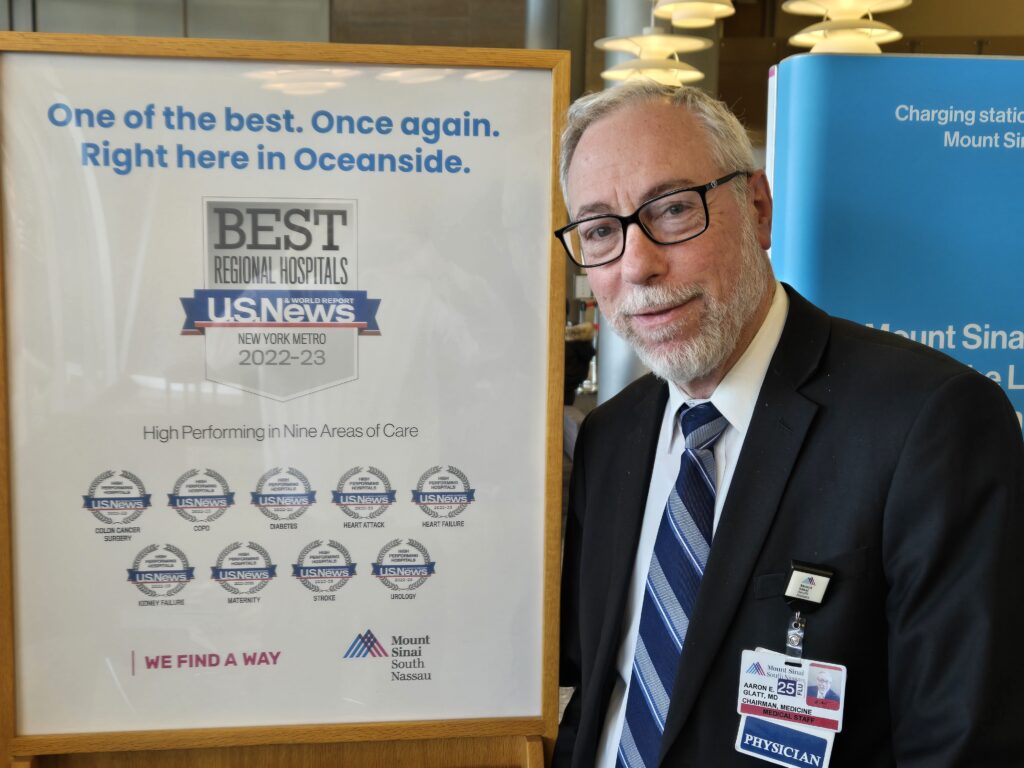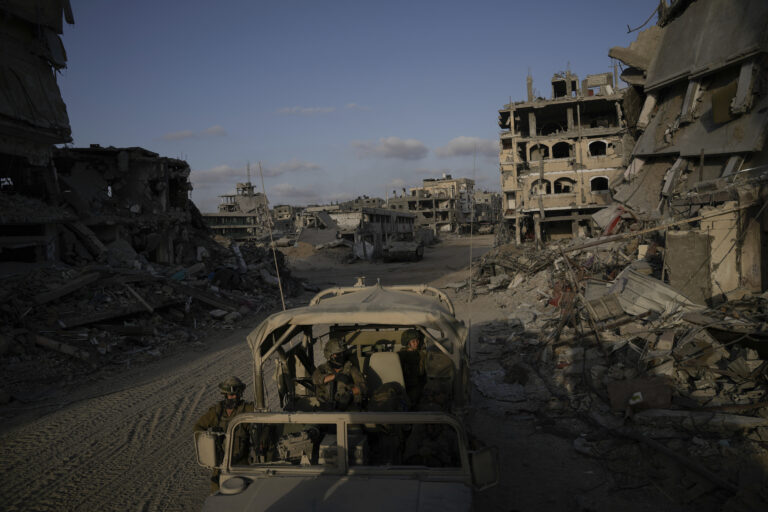By Rabbi Yair Hoffman
After having had three hospital stays at South Nassau hospital since mid-summer, and being duly impressed with the level of care, I interviewed Dr. Glatt, about the changes and the future. Dr. Glatt is the Chair of the Department of Medicine at Mount Sinai South Nassau. He also serves as the Chief of Infectious Diseases and is the Hospital’s Epidemiologist, and is in charge of the Infectious Diseases Society of America Designated Center of Excellence in Antimicrobial Stewardship. Dr. Glatt is also a Rabbi.
RYH: In the past ten years South Nassau has undergone some significant improvements in the quality of the healthcare that it delivers. How did that come about?
DAG: Part of that has been our relationship with Mount Sinai in virtually every way..recruitment, academic appts, it’s a great 2 way relationship.. it has been a very positive relationship.. I was involved in the search — we thought that Mount Sinai was the best
RYH: I noticed, as a patient at the hospital that your nursing staff is particularly nice, friendly and capable. How do you manage that? Is there a particular thing that you do in hiring? Do you have something akin to continuous education in mentschlechkeit so to speak?
DAG: Believe it or not, there is a magic secret. But it is called, “Magnet.” [Added later ACC Magnet Recognition] Only 3 or 4 percent of hospitals have it.. the nursing association developed it. We have received Magnet accreditation and various awards. We do a lot of their training and the like. They emphasize many things such as Exemplary Professional Practice, New Knowledge, Innovations, & Improvements; and studying Empirical Outcomes.
RYH: In the past ten years South Nassau has undergone some significant improvements in the quality of the healthcare that it delivers. How did that come about?
DAG: Part of that has been our relationship with Mount Sinai in virtually every way..recruitment, academic appts, it’s a great 2 way relationship.. it has been a very positive relationship.. I was involved in the search — we thought that Mount Sinai was the best
RYH: I noticed, as a patient at the hospital, that your nursing staff is particularly nice, friendly and capable. How do you manage that? Is there a particular thing that you do in hiring? Do you have something akin to continuous education in mentschlechkeit so to speak?
DAG: Believe it or not, there is a magic secret. But it is called, “Magnet.” [Added later ACC Magnet Recognition] Only 3 or 4 percent of hospitals have it.. the nursing association developed it. We have received Magnet accreditation and various awards. We do a lot of their training and the like. They emphasize many things such as Exemplary Professional Practice, New Knowledge, Innovations, & Improvements; and studying Empirical Outcomes.
RYH: A number of older people are moving into the Five Towns to be closer to their kids. How is the hospital preparing for the growing healthcare needs of an aging population?
DAG: Yes, that is certainly a correct demographic point. Our hospital is fully geared to deal with the needs of an aging population as well. To keep things even closer, ee just put a new geriatrician in the Mount Sinai Hewlett practice to specifically deal with this
RYH: What about strokes? The Joint Commissions has four levels: 1] Comprehensive Stroke Center (CSC) certification 2] Thrombectomy-Capable Stroke Center (TSC) 3] Primary Stroke Center (PSC) And 4] Acute Stroke Ready Hospital (ASRH). My understanding is that near the Five Towns area Jamaica Hospital and Northshore are CSC. But for some reason, people don’t go to Jamaica from the Five Towns/Far Rockaway area. Jamaica Hospital is 17 minutes away at 8.5 miles. Northshore is 26 minutes away at 15.7 miles and South Nassau is 14 minutes away at 6.5 miles. What is the status of the plans for South Nassau to become TSC? Are there any future plans for it to become even CSC? What is involved and how can the local community help?
DAG: We are Thrombectomy Capable now.. We have everything in place.. We do it now, we just don’t do it 24/7.. We are recruiting for addntal people. We have all the equipment.. We have a special stroke team with fellowship trained stroke neurologists in place. I project that we will be fully TSC withinin the next year or so.
RYH: What are other areas are there in which the hospital has improved?
DAG: Across the board. Full Cardiac surgery here. The Mount Sinai A team will be here at the end of 2025. We are not hiring a B team.. It will expand our interventional cardiac surgery..
In GI we have senior people in Dr. Stravopolis is nationally known personality.. We have an endo-bariatric specialist team, we have advanced in that area significantly. Our GI services are superb.. We have internationally recognized neurosurgeons – Dr. Bullineis.. Dr. Hooten is a well known back surgeon.. Our Urology dept. is superb.. In Cancer and neck surgery our department is recognized and we have won awards. Our cancer program is also local.
We are trying to make sure that we have those specialists in the city spending time here. We are recognized in Infectious Diseases. We have a great low score in hospital acquired infections. the intensive care unit is . We have expanded. We have 9 slots that are reserved for Shomer Shabbos.. We try to be attentive to the community — many of the doctors in are in the 5 Towns.
RYH: Regarding echocardiograms there is a new AI software called PANECHO that has been hailed as the next step in both catching things as well as increasing the speed of reading them. Is South Nassau looking at this yet? Are there alternatives to it that you are exploring?
DAG: AI Mount Sinai has an entire dept of AI.. EMR electronic.. We are looking at many different AI’s computer robotic surgeries..We have a whole dept that specializes in that. They are considering a number of the softwares. I am not aware of that specific product.
RYH: What can you tell me about the Shabbos house?
DAG: The hospital provides the Shabbos house — we have the funding for i and we are remodeling to double the room capacity Achiezer helps stock it with food. The hospital owns the property and is kind enough to allow its use for family members of patients.
RYH: Does it have mezuzos?
DAG: I put them up myself..
RYH: Seforim?
DAG: We have Seforim in the hospitality room where we daven Mincha. (1:35 PM)
RYH: The hospital recently invested in a new biplane imaging system and two-bed Epilepsy Monitoring Unit.
DAG: The first is available for all the departments. We are trying to make sure that you don’t have to leave and go to the city for advanced medical care.
RYH: What other major technological investments are in the planning for the neurosciences program?
DAG: We just hired several new surgeons.. We have muscularskeletal people.. We have stroke trained..
RYH: It seems that South Nassau has taken on several expansions in neurological services. What drove the decision to focus on growing this particular service line?
DAG: We are growing everything that needs to be grown.. We hired 3 new endocrinologists where there is a huge need. We have 3 in oceanside and 2 in manhasset 5 or 6 that do outpatient because there is such a need..
RYH: Recently, a neighbor told me that her sister-in-law flew in from Canada to specifically use a back specialist at South Nassau. Can you discuss this particular area in which South Nassau is so advanced?
DAG: Dr. John Houten.. Our chair of Orthopedics is also a well known specialist
RYH: You recently added specialists like Dr. Stavropoulos and Dr. Advani to your staffing. Can you discuss their particular specialty and how they helped change things at the hospital.
DAG: Dr. Stavropoulos who does procedures is the father of something called, “3rd space endoscopy.” [Added later: “third space”, which is the potential space inside the wall of the GI tract. Most commonly, this means working in the submucosal layer of the organ wall.] This saves people from having more surgery — he removes certain tumors POEMS — it is a type of surgical procedure.. They remove things from the stomach and the esophagus.. Essentially, she does endo-bariatric procedures for weight loss through endoscopy. Also Dr. Frank Gress, who is the chief of the division is very much involved in this
RYH: How do you go about recruiting personnel in these types of specialties?
DAG: Being part of Mount Sinai is a boon for it — their website has international hits and we take advantage of that.
RYH: Are there “head-hunters” so to speak in this industry?
DAG: Sure. However, that is usually not the best way to go. Yes, I do contact them when necessary.
RYH: What specific improvements in specialty care are you still looking to fill?
DAG: We look for quality staff in all areas.. We are looking at Hospitalists — internists.. The private doctors are in the hospital they are in the hospital full time. It is a new emerging specialty that has vastly improved medical care in hospitals that do it and it is attracting top staff.
RYH: Does being so connected to Mount Sinai systems limit the hospital in any way?
DAG: I would say no, that it doesn’t. Mount Sinai uses buying power to bring down prices. If the system uses product B we use that now.. It’s a limitation but I don’t think that’s a concern.. The biggest advantage is the advanced cancer care and the heart surgery.. In GI you don’t have to go into the city to receive top-notch treatment. You can do it right here.
RYH: What are the biggest challenges you face in bringing advanced specialty services to the South Shore communities?
DAG: It is always money, decisions about what to prioritize.. What we can do with the resources? Boruch hashem, funding is not lacking now. So these decisions are much easier.
RYH: Do you have any educational initiatives in the works — for the local community? How about for the local high schools?
DAG: We do a lot of local programs we have a whole dept of community education.. local PTAs . I have spoken at the various JCCs. If any of the high schools want anything we would be happy to do that.. A woman by the name of Abbey From who is in charge of that. Any organization that is interested in developing programming should reach out to the hospital.
RYH: Is the hospital doing any interesting research?
DAG: There are numerous research projects going on. We did COVID research..As an example with one that we are working with the CDC — we helped plan the Uman trip for Rosh Hashana – to make it medically much safer. I do not go to Uman, but you have to improve the health of people wherever they are. We worked with the CDC and Chassidisha Rabbonim to make sure that it was as safe as possible. We actually received an award from the CDC for that published paper.
RYH: Sometimes hospitals partner with groups or organizations to promote and improve public health. Does South Nassau do that?
DAG: Yes, many. We work with Achiezer with Hatzolah we work closely with them.
RYH: Who manages the kosher food? In general, if you are outsourcing – the kosher catering places are not so health conscious. Is there any emphasis on trying to upgrade the health aspect of it?
DAG: Our café just had a huge upgrade.. They constantly look for excellence in the quality and taste of the food — while maintaining the highest standards of Kashrus… I insist that they only have the top notch hashgacha — we try to have everything Cholov Yisroel.. This is a business they have to be competitive.. They have to do what needs to be done..
RYH: What achievement at this hospital are you most proud of personally?
DAG: Well aside for the improvement of healthcare, and the saving of lives for so many people – I would say that we have worked to achieve 9 shomer Shabbos slots for observant doctors so that they do not have to deal with the challenges of not being there for their families. There are 9 people who for the 3 years of their residency will not have to work on Shabbos..
The author can be reached at [email protected]












One Response
He also gives a great Dirshu Mishnah Berurah Yomi https://outorah.org/series/3762/